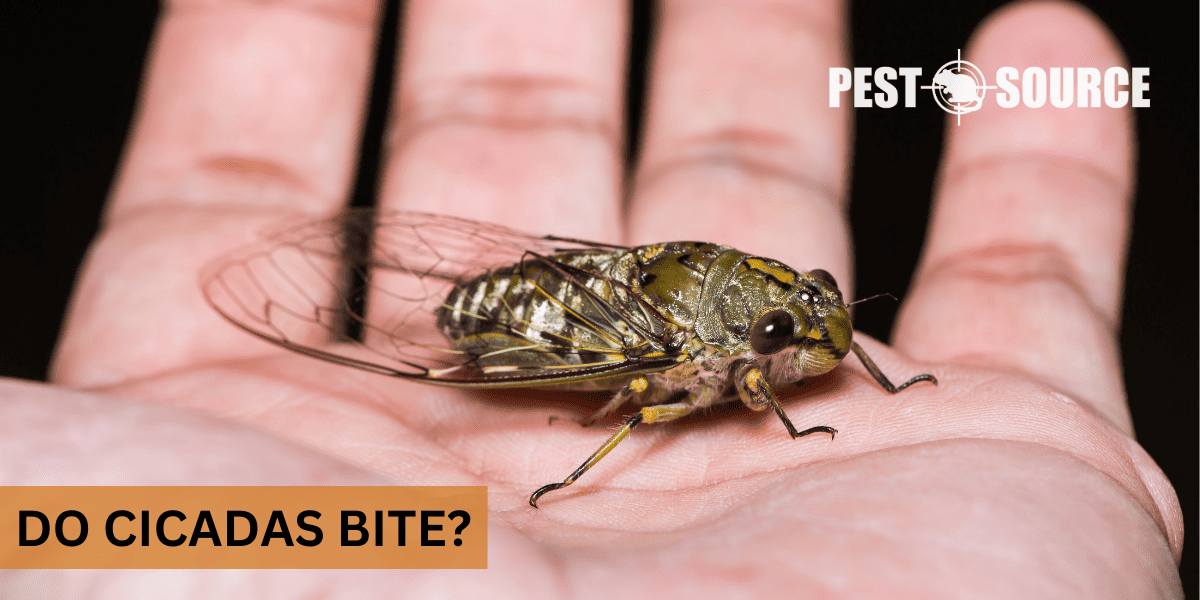Cicadas do not bite humans or animals. Their mouthparts are designed for sucking sap from plants, not for biting or chewing. Learn why these insects are harmless to people and what actually causes the concern during their emergence.
POINTS
- Cicadas do not bite or sting humans or animals as their mouthparts are designed for sucking plant sap.
- Cicadas are not harmful or poisonous to humans, and the overall threat level to human health is very low.
- While cicadas do not pose a direct threat to humans, precautions can be taken to minimize discomfort during their emergence.
- Dogs are not at risk from toxicity when eating cicadas, but ingesting large quantities can lead to gastrointestinal upset or choking.
- Preventing dogs from eating cicadas involves supervision, distraction, and training, with immediate veterinary attention advised if adverse effects are observed.
Do Cicadas Bite or Sting?
Cicadas are known for their distinctive sound, but many people often wonder if these insects can bite or sting. To put it simply, cicadas do not bite or sting humans or animals. They have mouthparts designed for sucking sap from plants, not for biting flesh. Therefore, any interaction with cicadas should not result in bites or stings.
Clarifying Misconceptions About Cicadas
There’s a common misconception that because cicadas are large and appear intimidating, they must be capable of biting or stinging. However, their behavior is not aggressive towards humans or animals, and their biology does not support this capability. Stinging is a defense mechanism typically associated with insects like bees and wasps, which cicadas are not related to.
Biting, on the other hand, is common in insects like mosquitoes and ticks, which again, cicadas do not emulate. Understanding this helps to alleviate any undue concern about cicadas’ interactions with people or pets.
Are Cicadas Dangerous to Humans?
Cicadas are not harmful or poisonous to humans. They do not carry diseases nor do they have venom. However, there are some health concerns to be aware of, albeit minor. For example, cicada mites, which sometimes live on cicadas, can cause irritation if they come into contact with human skin. But it’s important to note that this is not a common occurrence, and the overall threat level posed by cicadas to human health is very low.
Assessing the Health Risks of Cicadas
While cicadas are not dangerous to humans, their presence in large numbers can potentially lead to indirect health concerns. These may include allergic reactions to the shed skins of nymph cicadas or the loud noise they produce, which can potentially cause hearing damage in extreme cases. However, these risks are quite rare and generally cicadas are considered more of a nuisance than a health hazard.
Can Cicadas Hurt You?
In terms of physical harm, cicadas are not known to cause any direct discomfort or injury to individuals. Their activity primarily revolves around mating and feeding on plant sap, not interacting with humans. However, there are some situations where their sheer numbers can be overwhelming, leading to a higher likelihood of contact with people.
Precautions for Safe Interaction with Cicadas
When cicadas emerge in large numbers, it’s wise to take some simple precautions to ensure comfortable coexistence:
- Wear hats or use umbrellas to prevent cicadas from landing on your head or neck if you’re uncomfortable with them.
- Keep windows closed during peak cicada activity to prevent them from entering your home.
- Be mindful of cicada shells when walking, as they can be a slipping hazard on sidewalks and other surfaces.
While cicadas do not pose a threat, these tips can help avoid any unnecessary discomfort during cicada season.
Are Cicadas Dangerous to Dogs?
Pet owners often express concern about the interaction between their dogs and cicadas, especially during the mass emergence of these insects. The good news is, cicadas are not toxic to dogs. However, like any small object, they can pose a choking hazard or cause gastrointestinal upset if ingested in large quantities. Additionally, the exoskeleton of cicadas can be difficult for dogs to digest and may lead to digestive issues.



